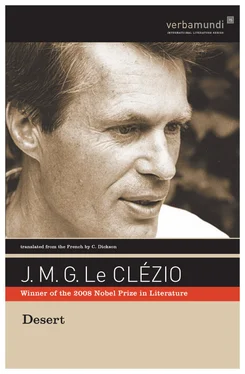Nour listened to the clamoring of voices growing louder, then subsiding, like the passage of the desert wind over the dunes, and there was a knot in his throat because he knew a terrible danger was threatening the city and all the men, a danger he was unable to understand.
Now, almost without blinking, he was watching the white shape of the old man standing very still between his sons in spite of the weariness and the cold night air. Nour thought that he alone, Ma al-Aïnine, could change the course of this night, calm the anger of the crowd with a wave of his hand or, on the contrary, unleash it with just a few words that would be passed from mouth to mouth and make the wave of rage and bitterness seethe. Like Nour, all the men were looking at him, eyes bright with fatigue and fever, minds tense with suffering. They could all feel their skin, leathered from the burning sun, their lips, blistered from the desert wind. They waited, almost without moving, eyes fixed, searching for a sign. But Ma al-Aïnine didn’t seem to notice them. In his eyes there was a steady remote look as he gazed out over the men’s heads, out beyond the dried mud walls of Smara. Maybe he was looking for the answer to the men’s anxiety in the depths of the nocturnal sky, in the strange blur of light swimming around the disk of the moon. Nour looked up at the place where he could usually see the seven stars of the Little Dipper, but he saw nothing. Only the planet Jupiter was visible, frozen in the icy sky. The haze of moonlight had covered everything. Nour loved the stars, for his father had taught him their names ever since he was a baby; but on this night, it was as if he couldn’t recognize the sky. Everything was immense and cold, engulfed in the white light of the moon, blinded. Down on earth, the fires in the braziers made red holes that lit up the men’s faces oddly. Maybe it was fear that had changed everything, that had emaciated the faces and hands and filled the empty eye sockets with inky shadows; it was night that had frozen the light in the men’s eyes, that had dug out the immense hole in the depths of the sky.
When all the men had finished speaking, each standing up beside Sheik Ma al-Aïnine in turn — all the men whose names Nour had heard his father utter in the past, chieftains of warrior tribes, the men of the legend, the Maqil, the Arib, Oulad Yahia, Oulad Delim, Aroussiyine, Icherguiguine, the Reguibat whose faces were veiled in black, and those who spoke the Chleuh languages, the Idaou Belal, Idaou Meribat, Aït ba Amrane, and even those whose names were not familiar, come from the far side of Mauritania, from Timbuktu, those who had not wanted to sit near the braziers, but who had remained standing near the entrance to the courtyard, wrapped in their cloaks, looking at once guarded and contemptuous, those who hadn’t wanted to speak — Nour observed each of them, one after the other, and he could feel a terrible emptiness hollowing out their faces, as if they would soon die.
Ma al-Aïnine didn’t see them. He hadn’t looked at anyone, except maybe once when his eyes had fallen briefly on Nour’s face, as if he were surprised to see him amidst so many men. Since that barely perceptible moment — quick as a flash in a mirror, even though Nour’s heart had begun beating faster and harder — Nour had been waiting for the sign that the old sheik was to give to the men grouped together before him. The old man stood still, as if he were thinking about something else, while his two sons, leaning toward him, spoke in hushed tones. At last he took out his ebony beads and squatted down very slowly in the dust, head bowed. Then he began to recite the prayer he had written for himself, while his sons sat down on either side of him. Soon afterward, as if that simple act had sufficed, the muttering of voices ceased and silence fell over the square, a cold and heavy silence in the overly white light of the full moon. Distant, barely perceptible sounds from the desert, from the wind, from the dry stones on the plateaus began to fill up the space again. Without saying goodbye, without a word, without making a sound, the men stood up, one after another, and left the square. They walked along the dusty path, one by one, because they didn’t feel like talking to one another anymore. When his father touched his shoulder, Nour got up and also walked away. Before leaving the square, he turned back to look at the strange, frail figure of the old man, all alone now in the moonlight, chanting his prayer with the top part of his body rocking back and forth like someone on horseback.
In the following days anxiety began to mount again in the Smara camp. It was incomprehensible, but everyone could feel it, like a pain in the heart, like a threat. The sun burned down hard during the day, bouncing its brutal light off the edges of rocks and the dried beds of torrents. The foothills of the rocky Hamada shimmered in the distance, and there were always mirages over the Saguiet Valley. New bands of nomads arrived each hour of the day, haggard with weariness and thirst, coming in forced marches from the south, and their silhouettes melted into the horizon along with the scintillating mirages. They walked slowly, feet bandaged with strips of goatskin, carrying their meager loads on their backs. Sometimes they were followed by half-starved camels and limping horses, goats, sheep. They set up their tents hastily on the edge of the camp. No one went to greet them or ask them where they came from. Some bore the marks of wounds from battles they had fought against the soldiers of the Christians or the looters in the desert; most were on the verge of collapse, spent from fevers and stomach ailments. Sometimes all that was left of an army arrived, decimated, bereft of a leader, womanless, black-skinned men, almost naked in their ragged garments, their glassy eyes bright with fever and folly. They went to drink at the spring in front of the gate to Smara, then they lay down on the ground in the shade of the city walls, as if to sleep, but their eyes remained wide open.
Since the night of the tribal assembly, Nour hadn’t seen Ma al-Aïnine or his sons again. But he distinctly felt that the great clamor of discontent that had been assuaged when the sheik had begun his prayer had not really stopped. It was no longer a matter of words, now. His father, his older brother, his mother said nothing, and they turned their heads away as if they didn’t want to be asked any questions. But the anxiety was still mounting, in the sounds of the camp, in the bleating of the livestock that were growing impatient, in the sound of the footsteps of newcomers arriving from the south, in the harsh words that men spit out at one another or at their children. Anxiety was also present in the sharp odors of sweat, of urine, of hunger — so much acridity seeping up from the ground and from the hidden recesses of the camp. It mounted as food became scarcer, a few pepper dates, sour milk, and oatmeal to be swallowed hastily at the crack of dawn, when the sun had not yet risen from the dunes. Anxiety was in the murky water of the well that the tramping of humans and beasts had disturbed and that green tea could not improve. Sugar had been rare for a long time, and honey too, and the dates were as dry as rocks, and the tough pungent meat came from camels that had died of exhaustion. Anxiety was rising in the dry mouths and bloody fingers, in the weight that bore down on the heads and shoulders of the men, in the heat of day, and then in the cold of night, making children shiver in the folds of worn carpets.
Each day as he walked past the campsites, Nour heard the sound of women crying because someone had died in the night. Each day people edged a little further into despair and anger, and Nour felt his throat growing tighter. He thought of the sheik’s distant gaze drifting out over the invisible hills in the night, then coming to rest on him for a brief moment, like a flash in a mirror that lit him up inside.
Читать дальше












